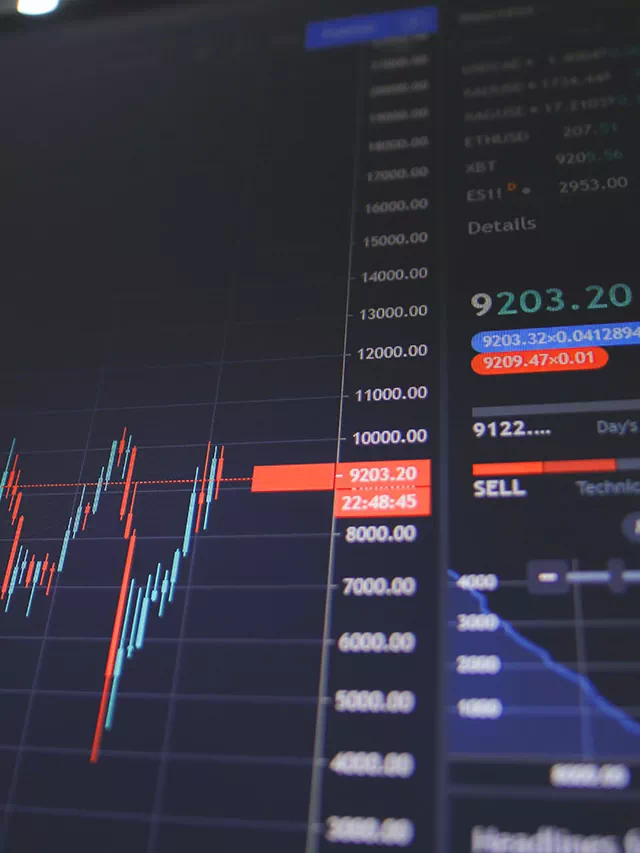The stock market is not based solely on luck. While there are always unpredictable events and market movements that can impact the value of investments, the stock market is generally driven by a range of economic, political, and corporate factors. Investing in the stock market always comes with some level of risk, and it’s impossible to guarantee any specific outcome. However, investing in the stock market can be a safe and potentially profitable long-term strategy if you do your research and follow sound investment principles.
Here are some of the factors that can impact the stock market:
Economic indicators: Economic indicators such as interest rates, inflation, and GDP growth can impact the stock market. Economic indicators are statistics that measure the performance of an economy or specific sectors of an economy. These indicators provide insight into the overall health and direction of an economy and can be useful for investors in making informed investment decisions. Here are some commonly used economic indicators:
- Gross Domestic Product (GDP): GDP is the total value of goods and services produced in a country over a specific period, usually one year. It’s a broad measure of economic activity and is often used to track the overall health of an economy.
- Unemployment rate: The unemployment rate measures the percentage of people who are unemployed but actively seeking employment. A high unemployment rate may signal weakness in the labor market and overall economy.
- Inflation rate: The inflation rate measures the rate of increase in prices for goods and services over time. High inflation can erode the purchasing power of a currency and impact the overall economy.
- Interest rates: Interest rates are the cost of borrowing money and can impact consumer and business spending. Changes in interest rates can also impact the performance of bonds and other fixed-income investments.
- Consumer confidence index: The consumer confidence index measures the level of confidence that consumers have in the economy and their own financial situation. High consumer confidence can be a positive sign for the economy and may lead to increased spending.
- Manufacturing activity: The level of manufacturing activity can provide insight into the health of the manufacturing sector and the broader economy. The Institute for Supply Management (ISM) publishes a monthly report on manufacturing activity in the United States.
Investors can use economic indicators to help guide their investment decisions, but it’s important to remember that no indicator is foolproof and that unexpected events can impact the markets.
Political events: Political events such as elections, government policy changes, and geopolitical tensions can impact the stock market. Political events can have a significant impact on the stock market, both domestically and globally. Here are some examples of political events that can impact the stock market:
- Elections: Elections can create uncertainty in the markets, as investors may be uncertain about how a new administration or government will impact the economy and specific industries.
- Government policy changes: Changes in government policies related to taxes, trade, and regulations can impact specific industries and stocks.
- Geopolitical tensions: Geopolitical tensions such as wars, conflicts, and sanctions can create uncertainty and volatility in the markets.
- International trade agreements: International trade agreements such as the North American Free Trade Agreement (NAFTA) and the Trans-Pacific Partnership (TPP) can impact global trade and the performance of specific industries and companies.
- Central bank decisions: Decisions made by central banks, such as interest rate changes and monetary policy decisions, can impact the stock market and other asset classes.
Investors should pay attention to political events and how they may impact the economy and specific industries, but it’s important to remember that not all political events will have a significant impact on the stock market. It’s essential to take a long-term approach to investing and to diversify your portfolio to mitigate risk.
Corporate earnings and performance: The earnings and performance of individual companies can impact their stock prices and the broader market. Corporate earnings and performance are one of the most significant factors that impact stock prices. Here are some ways in which corporate earnings and performance can impact the stock market:
- Revenue growth: When companies report strong revenue growth, it can indicate that the company is performing well and that its stock price may increase.
- Earnings per share (EPS): EPS is the portion of a company’s profit allocated to each outstanding share of common stock. When companies report higher EPS than expected, it can lead to increased demand for the stock and a rise in stock price.
- Dividends: Dividends are payments made to shareholders as a portion of the company’s profits. Companies that pay dividends consistently or increase their dividends over time may attract investors seeking income.
- Guidance: Companies often provide guidance on their expected future performance. When companies provide positive guidance, it can lead to increased demand for their stock and a rise in stock price.
- Competition: Competition within an industry can impact a company’s earnings and performance. Companies that are able to outperform their competitors may see increased demand for their stock.
Investors should pay close attention to a company’s earnings and performance when making investment decisions. However, it’s important to remember that past performance does not guarantee future results, and unexpected events can impact a company’s future performance. It’s important to diversify your portfolio across different sectors and industries to mitigate risk.
Investor sentiment: Investor sentiment, or the overall mood of investors, can impact the stock market. When investors are optimistic, the market tends to rise, and when they are pessimistic, the market tends to fall. Investor sentiment refers to the overall attitude or mood of investors towards the stock market and the economy. Investor sentiment can have a significant impact on the stock market, as it can influence investor behavior and decisions. Here are some examples of how investor sentiment can impact the stock market:
- Bullish sentiment: When investors are optimistic about the economy and the stock market, it can lead to increased demand for stocks and a rise in stock prices.
- Bearish sentiment: When investors are pessimistic about the economy and the stock market, it can lead to decreased demand for stocks and a decline in stock prices.
- Fear and greed: Fear and greed are emotions that can drive investor sentiment. When investors are driven by fear, they may sell stocks in anticipation of a market downturn. Conversely, when investors are driven by greed, they may buy stocks in anticipation of a market upturn.
- Market volatility: High levels of market volatility can impact investor sentiment, as it can create uncertainty and anxiety among investors.
- News events: News events such as economic data releases, corporate earnings reports, and political events can impact investor sentiment.
It’s important for investors to pay attention to investor sentiment when making investment decisions, but it’s equally important to maintain a long-term perspective and avoid making impulsive decisions based on short-term fluctuations in sentiment. Diversification and risk management are key to successful investing.
Stock market prediction
Stock market prediction refers to the practice of trying to forecast future stock market movements and performance. While many individuals and organizations attempt to predict the stock market, it’s important to note that predicting the stock market is notoriously difficult and unreliable. Here are some reasons why:
- Unpredictable events: Unforeseeable events such as natural disasters, political turmoil, and pandemics can have a significant impact on the stock market, and it’s impossible to predict when these events will occur. Unpredictable events are events that cannot be predicted with certainty and can have a significant impact on the stock market. Examples of unpredictable events include natural disasters, political turmoil, pandemics, and unexpected changes in government policy. These events can cause sudden shifts in investor sentiment and can lead to increased market volatility. One example of an unpredictable event that had a significant impact on the stock market is the COVID-19 pandemic. In early 2020, the outbreak of the pandemic led to widespread lockdowns and business closures, which caused a significant decline in stock prices. The pandemic also had a profound impact on consumer behavior, with many people reducing their spending and avoiding travel, which had negative implications for many businesses. While unpredictable events are difficult to predict, investors can still take steps to manage risk. One way to mitigate risk is through diversification, which involves investing in a variety of stocks and other assets to spread risk across different sectors and industries. Additionally, investors can maintain a long-term perspective and avoid making impulsive decisions based on short-term market movements.
- Complexity of the economy: The economy is a complex system that’s influenced by a wide range of factors, including interest rates, inflation, and consumer spending. Predicting how all these factors will interact with each other and impact the stock market is challenging.
- Efficient market hypothesis: The efficient market hypothesis suggests that the stock market is already reflecting all available information, and it’s impossible to consistently outperform the market by predicting future stock prices.
- Short-term volatility: Short-term market movements are often unpredictable and can be influenced by emotions and irrational behavior.
While it’s tempting to try to predict the stock market, it’s important to remember that successful investing involves a long-term perspective and a focus on factors that you can control, such as diversification and risk management. Instead of trying to predict the market, investors should focus on building a well-diversified portfolio of high-quality stocks and other investments that align with their long-term financial goals.
While there is some element of luck involved in investing, successful investing requires research, analysis, and disciplined decision-making. Investors who take a long-term approach and diversify their portfolios across different asset classes and industries can potentially mitigate risk and achieve their financial goals.




